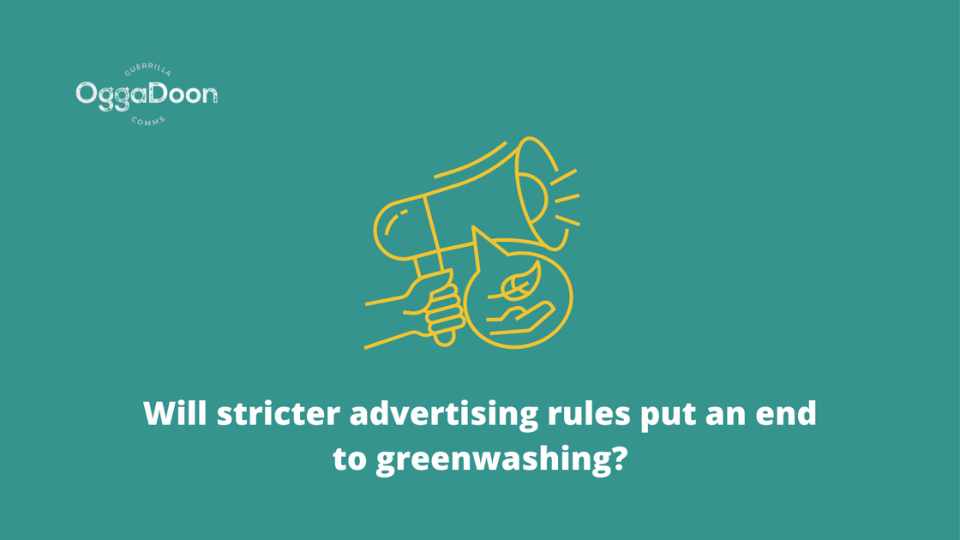
Senior Business Administrator
January at Future Leap
‘Twas a Green Christmas at Future Leap
November at Future Leap
October at Future Leap
September at Future Leap
August at Future Leap
Will stricter advertising rules put an end to greenwashing?
This article was written by OggaDoon.
The deceptive marketing practice of ‘greenwashing’, where companies falsely present themselves as more environmentally friendly or sustainable than they really are, has been a hot topic in the last few years. As brands realise just how many consumers prioritise sustainability and ethical brand values that align with their own, more and more big names have been scrambling to present themselves as an environmentally friendly purchasing choice – even when that’s not really the case.
Why are brands greenwashing, anyway?
The problem with greenwashing isn’t just that it’s disingenuous. It’s that it makes it harder for consumers to know which brands truly are sustainable and which aren’t. And, for brands that get caught out in the lie, it can cause major reputational damage. The good news is that stricter rules from advertising regulators, consumer watchdogs, and governments can significantly impact the ability of brands to engage in greenwashing in their marketing campaigns. These rules look likely to impose clearer guidelines, enhance scrutiny and enforcement, demand independent verification, and promote transparency and disclosure to protect consumers from being misled.
Here’s how stricter rules can make it harder for brands to greenwash:
Clearer guidelines and definitions
By establishing clear guidelines and definitions of what constitutes environmentally friendly practices, it will become harder for brands to claim credentials that they don’t truly hold. It will also be harder for them to plead ignorance when they’re caught out.
More scrutiny and enforcement
Advertising regulators and consumer watchdogs are likely to dedicate more resources to monitoring and investigating greenwashing practices, which in turn may lead to a whole new tranche of businesses being found out. This heightened enforcement will also deter brands from making false or exaggerated claims, in fear of both penalties and reputational damage.
Necessary verification
If audits, certification, and science-backed testing are enforced, companies will be unable to make environmental claims without proof, or at least independent verification by a third-party. The result will be increased credibility for brands’ sustainability claims and reduced opportunity for brands to engage in unsubstantiated greenwashing.
Increased transparency
Tighter regulations around environmental claims often tend to focus on transparency and disclosure requirements. If companies have to disclose detailed information about their environmental practices, including the methodologies used to measure their impact and the steps taken to mitigate negative effects, it will become harder for them to manipulate or misrepresent their environmental efforts.
Better education and awareness
Stricter rules often go hand in hand with increased consumer education and awareness campaigns. As consumers become more informed about greenwashing tactics, they become more critical and discerning in their purchasing decisions. Many brands have come up against greater scrutiny from well-informed consumers, making it riskier to engage in greenwashing practices, and turning these brands into a warning for others who were considering greenwashing their communications.
Risk to reputation
Connected to education and awareness, greenwashing can seriously damage a brand’s reputation if exposed. Rightly, companies fear the negative consequences of being caught engaging in deceptive marketing practices as it can lead to a loss of trust and loyalty, ultimately impacting a brand’s long-term success.
The benefits of harsher greenwashing standards
Greenwashing can mislead and deceive consumers who genuinely want to make environmentally conscious choices. Stricter regulations make it harder for brands to make false or exaggerated claims, and ensure that consumers can trust the information brands give them. It also means that consumers can make more informed decisions, and support companies that genuinely do prioritise sustainability. Because greenwashing undermines the efforts of companies that genuinely invest in sustainable practices, it makes it harder for consumers to differentiate between brands that are truly committed to sustainability and those that are merely capitalising on the trend.
Is this the end of greenwashing?
New regulations should level the playing field, and encourage companies to invest in legitimate sustainability initiatives. They will also increase corporate accountability by holding companies responsible for the accuracy of their environmental claims. And when companies face consequences for engaging in greenwashing, it sends a message that dishonest marketing practices will not be tolerated – by watchdogs and by consumers. Ultimately, by making greenwashing harder, stricter rules can incentivise companies to adopt more sustainable practices throughout their operations, and help to restore trust in authentically sustainable brands by ensuring that environmental claims are genuine and substantiated. While stricter advertising rules won’t completely eliminate greenwashing, they are a significant step toward reducing its prevalence.
By fostering genuine sustainability efforts, driving corporate accountability, and promoting trust and credibility, stricter rules incentivise companies to invest in legitimate sustainability initiatives and protect consumers against disingenuous brands and advertising campaigns.


